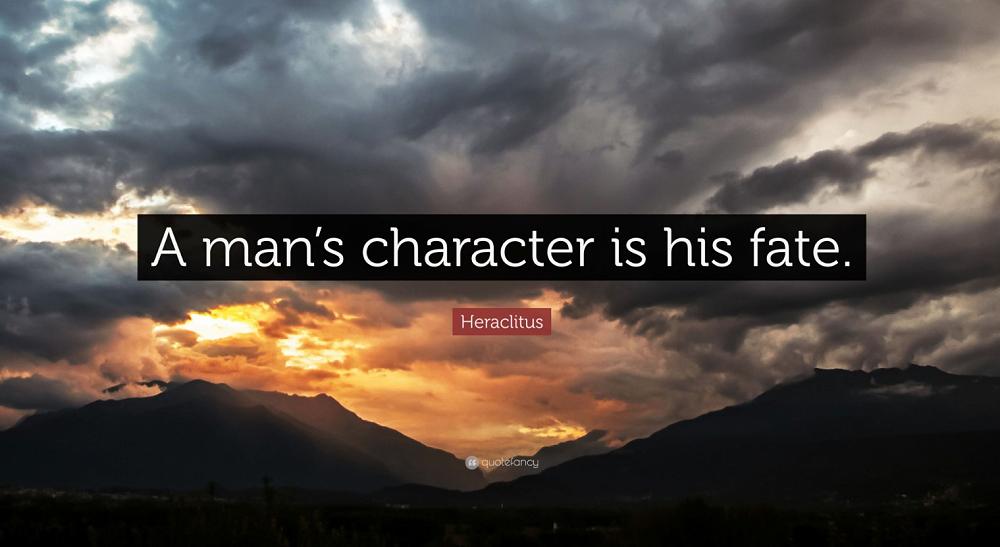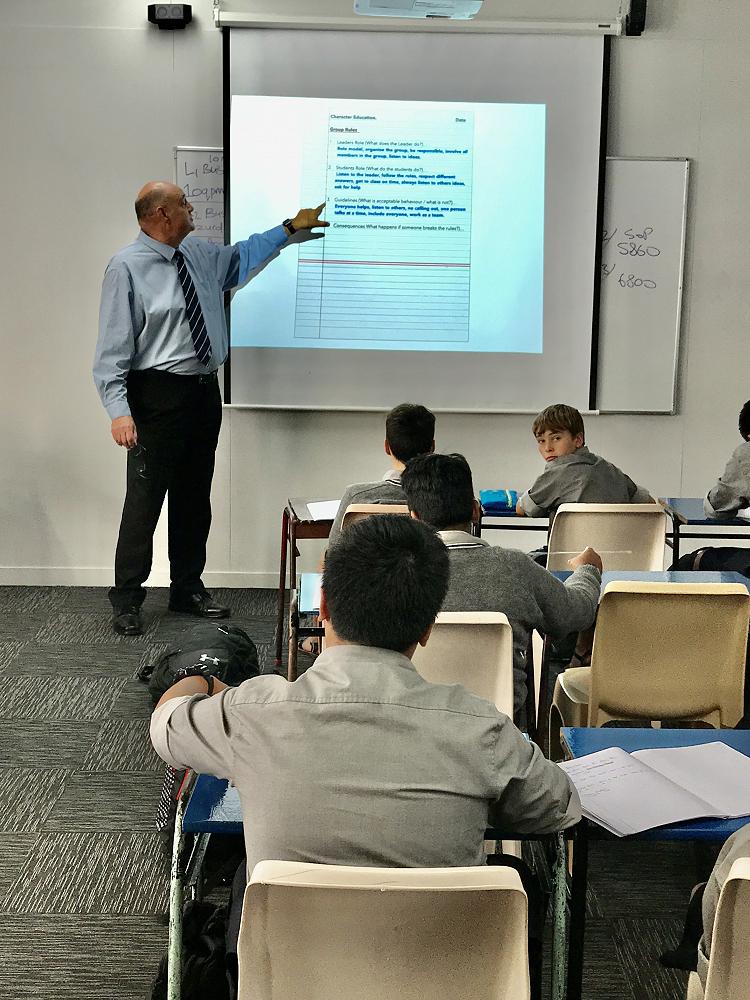
From the Deputy Rector
To Develop Educated Men of Outstanding Character | Hai Whakapakari i Ngā Tamatāne Kia Purapura Tuawhiti
Character Education - Living Our School Values
Much of the work we do to encourage and support the development of our young men's character is focused around our school values Tū Māia | Courage – Ngākau Mahaki | Humility – Te mahi tahi | Industry – Tū Rangatira | Integrity – Tū Whakahī | Pride – Tū Whakaaute | Respect. We hope that by highlighting and some of the ideas we are discussing with our young men we can extend the dialogue beyond the school gate and into the homes of our school community.
As the school year has begun we have had many opportunities to highlight one of our school values, Tū Māia | Courage, with both our young men and wider school community. When we use this term we often think of physical courage, perhaps that of the soldier or that exhibited on the sportsfield or another physically demanding arena. However, Tū Māia | Courage is a multifaceted concept, several of which are explored in 'Character Carved in Stone: The 12 Core Values of West Point That Build Leaders and Produce Success', written by Pat Williams, the Senior Vice President of the Orlando Magic. These include:
Physical courage - the willingness to risk life and limb for the sake of others or a righteous cause; and,
Moral courage - "the unshakeable commitment to do what is right, regardless of the personal cost, regardless of opposition and criticism, regardless of the risk of being abandoned or hated, regardless of disapproval or condemnation by other people. Moral courage is the commitment to stand utterly alone and friendless to do what is right"; and,
Emotional courage - the willingness to endure loss, anxiety, fear and other forms of emotional pain.
The message that is instilled through the West Point Military Academy is that the best way to overcome your fears - to act with courage - is to embrace them, as the longer you avoid your fears, the bigger they grow. "After you face your first and toughest fear, it becomes easier to face the next one, and the next, and the next" - build your courage one step at a time, a pertinent message.
Williams also emphasises the importance of determination, stating that "determination means making up your mind that you will achieve your goal. You will not give up. You will not accept defeat. You will not take no for an answer." Often it takes courage not to give up.
Unfortunately, the response from some young men when faced with a challenge is to avoid it and hope it will go away, while some parents work relentlessly to remove any possible challenges from their son's lives. Neither approach is beneficial. Having the courage to do the thing that is difficult, with parental support and encouragement, will help young men develop their resilience. Denying them these opportunities may remove some short-term 'pain' and discomfort, but will not benefit them in the long-term.
Living Our Best Life
Ruia taitea, kia tū ko taikākā | Shed those outer layers and reveal your internal courage.
In explaining this whakataukī in 'Aroha: Māori wisdom for a contented life lived in harmony with our planet', Dr. Hinemoa Elder asks the question 'What is it going to take for us to live our best lives?' and describes digging through our layers to find the central core, our "strong inner heartwood". Questioning ourselves and truly and honestly reflecting on who we are and our behaviour requires courage because sometimes we may not like the answers. However, it is an essential step to helping us become the best version of ourselves that we can.
Becoming a person of outstanding character requires introspection; taking the time to think seriously about our thoughts and actions, as it is these things that define who we are. This necessitates a certain level of maturity and it is likely that most young men will require prompting and supporting in this process as they are guided to reflect on their actions. In doing so we hope that they will begin to realise the person they want to become and find the inner strength necessary to support this journey.
The Courage of One's Convictions
A recent Stuff news article (Click here to read the full article) reflected on the plight of New Zealand's conscientious objectors who refused to fight in World War Two, some of whom were imprisoned at Whitaunui Detention Camp near Shannon. These men endured persecution that went well beyond the war years: "Upon their return, many struggled to find work, suffered from mental health issues, and withdrew or were not welcome in social circles.
Rod Bennett, son of imprisoned Quaker Norman William Bennett, wrote in his testimony he was excluded from activities as a child and bullied for defecting due to his religious beliefs.
But when he questioned his mother about his father’s character as a man, she replied: “What is the braver thing to do, to sign up and go to war like everyone else, or to stand up for what you believe in and go against the crowds?” - a great summation of the challenges one might face when acting with true moral courage.
Everyday Courage
In earlier communication we recognised that for some young men simply coming through the school gate to begin their time at a new school, or to move from one year level to another, is a courageous act as they overcome the associated anxiety.
The young men involved in the Crest to Crest Challenge demonstrated significant physical and mental courage as they pushed themselves to both compete and complete. In the Crest to Crest, Jayden Glentworth was singled out by his peers for the courage he displayed and the fantastic example he set.
For some Year 13 students, the ascent of Mt. Ruapehu and completing the Tongariro Crossing were significant challenges that put them well outside of their comfort zones.
Chris Harris, CEO of the New Zealand Holocaust Centre, had a powerful message for our young men about the importance of being an upstander - having the moral courage to stand up for what you know is right and showing genuine respect for others.
Old Boy and former All White Mr. Adrian Elrick spoke about the importance of having the courage to move outside your comfort zone if you are to achieve the goals you set for yourself.
Every week at assembly we hear from young men who give reports on school activities, promote community service activities and present book reviews. Standing at the lectern and presenting to 1800 of your peers is a challenge and those who put themselves outside of their comfort zone to do so have certainly shown the courage to embrace their fears.
What might constitute an act of courage can vary from person to person and it has been great to see and hear about so many 'everyday' examples of this value in action from our young men.
Fatum Ingenium Est – Character is Fate
Greek philosopher Heraclitus stated that a man's character is his fate (or destiny, depending on the translation). What he meant was our character decides everything. It determines who we are and what we do. Develop good character and all will be well. Fail to develop good character and nothing will be right. As we experience the inevitable ups and downs, success, failures and challenges that life throws at us it can be hard to keep this in mind. Ultimately though we need only care about our character as everything else comes from it. “Life is short,” Roman Emperor Marcus Aurelius said, and “the fruit of this life is a good character.” It is true in reverse too: A good life is the fruit of good character. Fatum Ingenium Est – Character is fate.

Click here for some more thoughts on the 'wisdom of the ancients’.
Year 9 Core Module Character Education
From the beginning of the 2021 school year, we have added Character Education to the Core Module subject rotation that all young men in Year 9 complete. This allows our Leadership Director, Mr. Anthony Lobb, to work directly with all of our Year 9 students during the year as we continue to encourage them to become the very best version of themselves that they can be. The Character Education course is focused on developing an understanding of virtues and values so that young men can apply them to their everyday decision-making.

How to Teach Your Teen Values
From the Centre for Parent and Teen Communication (https://parentandteen.com/):
“You just caught your teen red-handed… doing something good. Not the words you were expecting, right, but “catching” them in the act of doing the right thing gives you an opportunity to reinforce the values you’ve cared about all along. Letting your teen know that you noticed them putting good into the world holds more power than telling a teen when they’re doing something wrong. So look for all the ways your teen is putting the values you’ve taught them into action, and reinforce them again by “catching” them in the act.”

